Network Testing, New Features, Memorandum Capital Partnership
During July Papyrus R&D Team were focused on security testing and preparing Papyrus MainNet launch. We are excited to share the results with you.
We would once again like to express our openness to our community. We are eager to talk about the successes and victories as well as about the problems and solutions we’ve found.
Papyrus Explorer Update
When we started testing our voting system for nodes, we quickly discovered the need for a tool to show the current state of the voting process.
To understand how close the voting is to an end — our developers had to check the state of the smart contract. There is no problem here for our developers, but this is quite inconvenient for our users. To fill this gap we had to start developing a new page in our explorer, that shows not only the state of all Authority Nodes but also the state of the voting processes.
Nodes Synchronization Challenge
Early on, while testing our network we faced a tricky issue: adding a new Authority Node could lead this new Node into a state where it could not synchronize the state of the ledger beyond the date of Node inclusion.
It took our team many hours to fix, but we made it!
In the Papyrus Network we have two processes: one is responsible for synchronization, the other is for checking the validity of the synchronized blocks.
The first process was executed slightly faster and was the first one to reach the block, in which the authority node was either added or removed. But the second process was slower and Authority Node has not been added to the authorization list by the time when the first process has to process the block. As a result, we had a complex floating issue.
Fortunately, we found quite ingenious and, most importantly, a very reliable solution to this problem: those nodes that seal new blocks now leave notes in their headers. The headers say: “in this block, that node was added and/or that node was removed”. These marks help the synchronization flow of the new Authority Node to maintain the correct list of Authority Nodes and not to fail until the second process validates the blocks.
On our radar we have only two important points left that require stabilization:
- Enable quick (hourly) recalculation of the gas limits based on the network token stakes;
- Fix stake delegation, which allows dApp developers to subsidize smart contracts execution gas with from any stake address by delegating part of the stake to the contract. It removes burden from the end-user and wallets, allowing them to freely use dApp smart contracts without caring about gas calculations. dApp developers will be able to control all necessary gas usage controls on their own.
First Authority Node Partner
We are happy to announce that Memorandum.Capital is the first partner, which joined the Papyrus ecosystem to run Authority Node in the MainNet.
Memorandum.Capital is a global investment advisory company focused on VC and STO fundraising for companies on Series A/B/C, offering cutting-edge trustworthy options for both investors and investment-seeking enterprises. Backed up by a team of world-class experts with a vast team portfolio of more than $500 Million in VC and private equity and more than $4 Billion in public offerings, they bring high-end technology and more than 50 years of fundraising experience together to offer the most precise, secure and beneficial investment opportunities available on the market. Memorandum.Capital aims to form an efficient investment ecosystem, where every party is thriving in a mutual win-win.
Memorandum.Capital has offices in Poland, Korea, Australia, Russia, Switzerland, Malta and United Kingdom. Memorandum will support and promote Papyrus.Network among wide network of their partners worldwide.
In August, after fixing discovered network issues, we will launch public beta testing of network security and reliability.
Keep tuned, new partnership agreements and our progress around MainNet launch will be shared in upcoming announces.
